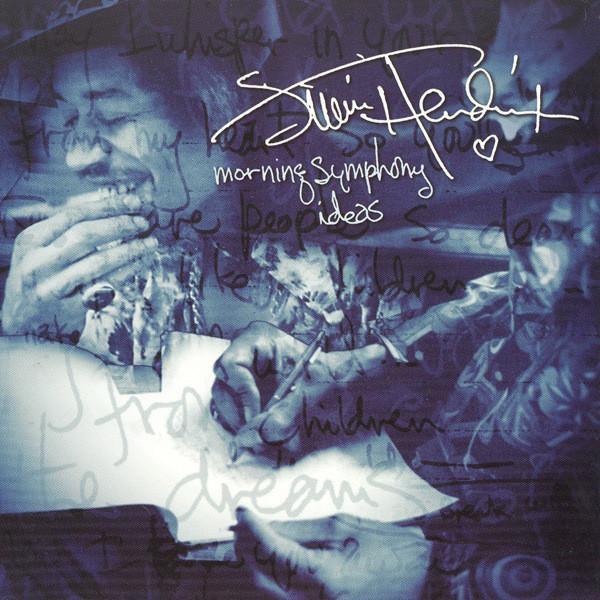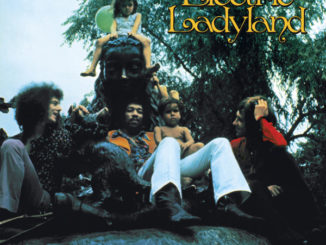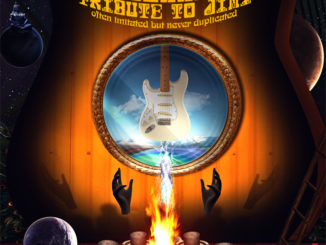
One wonders how a guy with only three studio releases during his lifetime has a posthumous discography reaching well into double digits. This is without even counting unofficial recordings. Like many legacy artists, Hendrix’s swelled catalog is partially the result of inflation from duplication and repackaging in the form of rereleases and greatest hits. However, much of the volume consists of material fans legitimately have not heard before whether in the form of live versions, demos, or studio jams. Not only is Hendrix’s live work well-documented, Hendrix seems to have had a guitar in hand virtually all of the time and spent a lot of time recording.
Of the posthumous studio releases, some such as Voodoo Soup. have undergone extensive studio reworking and while they may be enjoyable in their own context, they often reflect someone’s else agenda. Others remain relatively pure, such as First Rays of the New Rising Sun, and attempt to follow and fulfill Hendrix’ vision to the degree that it can be known. Both records give us partial and compromised final versions of Hendrix. In some instances, there are suggestions, indications, and instructions that provide guidance—without answering every possible question that might later arise—but what final decisions Hendrix would have made, what he might have developed at the last minute, added, move around, changed we have no way to know. Simply put, Hendrix obviously did not have authority over his posthumous releases and others had to finish them up without Hendrix’s complete input.
Dagger Records, established by Hendrix’s sister who oversees his catalog, has a special subset of releases that are basically official bootlegs consisting of public concerts, closed jams, and demos. The basic idea is that they don’t enough commercial appeal for a major release for the average listener, but Hendrix fans will enjoy them.
One of the early releases is Morning Symphony Ideas (2000), a collection of studio and home recordings from 1969 to 1970 mostly recorded in New York. With just six songs, you might wonder why this wasn’t released as an EP. However, tracks one and five add up to almost fifty minutes of music. In all, listeners get about an hour and ten minutes of music.
“Keep on Groovin” is over twenty-eight minutes of Hendrix jamming with drummer Buddy Miles on a sort of flamenco/blues/R&B/funk/rock medley including “Power of Soul,” “Burning Desire,” and “Stepping Stone.” At the beginning you can hear engineer Bob Gotto say, “reel two, take one” and then Hendrix counts everyone in. At the beginning of track two, Hendrix says, “Let’s title this one ‘Jungle.’” “Jungle” contains wisps of “Ezy Ryder” and “Villa Nova Junction.” Again, Miles supplies percussion. At the end you can hear Hendrix singing the melody of “Freedom.” Hendrix and Miles play on “Room Full of Mirrors” and Hendrix sings. This time bassist Billy Cox joins Hendrix and Miles. The take includes a flash of “Message to Love.” Track four’s “Strato Strut” has a funk groove. Hendrix apparently liked “Strato Strut” enough to tell Cotto to “Save that” when he finished playing. “Scorpio Woman” is a nearly twenty-two minute collection that includes pieces and chunks of other songs such as “Midnight Lightning” and “Heaven Has no Sorrow.” This one is all Hendrix who provides guitar and vocals.
Lasting barely over a minute, “Acoustic Demo” winds down and finishes the collection. Recorded in Hendrix’s apartment, Hendrix plays an acoustic guitar. The album’s sparsest track, there are no drum, no bass, and no vocals. Like an after-dinner mint, “Acoustic Demo” is that brief, singular shot of sweetness that concludes a good meal.
There is a sense of intimacy in this record. It’s as if you are in the control room or maybe even closer, leaning against an unused amp in a corner of the rehearsal space or maybe sitting just across from Jimi in his New York apartment as he plays “Acoustic Demo.”
In the liner notes, John McDermott clarifies that “Jimi never intended for any of the music featured on this disc to be issued in its present form. These are not the lost tapes, the lost album, the lost anything.” Nonetheless, the music sounds really clear, dynamic, balanced, and full as these tapes are engineered and properly transferred. Still, keep in mind that most of these tunes have an unfinished quality and remember that the title of the album is Morning Symphony Ideas, not Morning Symphony Completed or even Morning Symphony Songs. These are ideas, drafts, sketches, concepts, bursts, flashes. If you can come to this recording without expecting too much and are willing to make some slight allowances for source limitations and the imperfections of spontaneous and exploratory playing, you can kick back and really enjoy this collection.
TRACKLIST
1. Keep on Groovin’
2. Jungle
3. Room Full of Mirrors
4. Strato Strut
5. Scorpio Woman
6. Acoustic Demo



